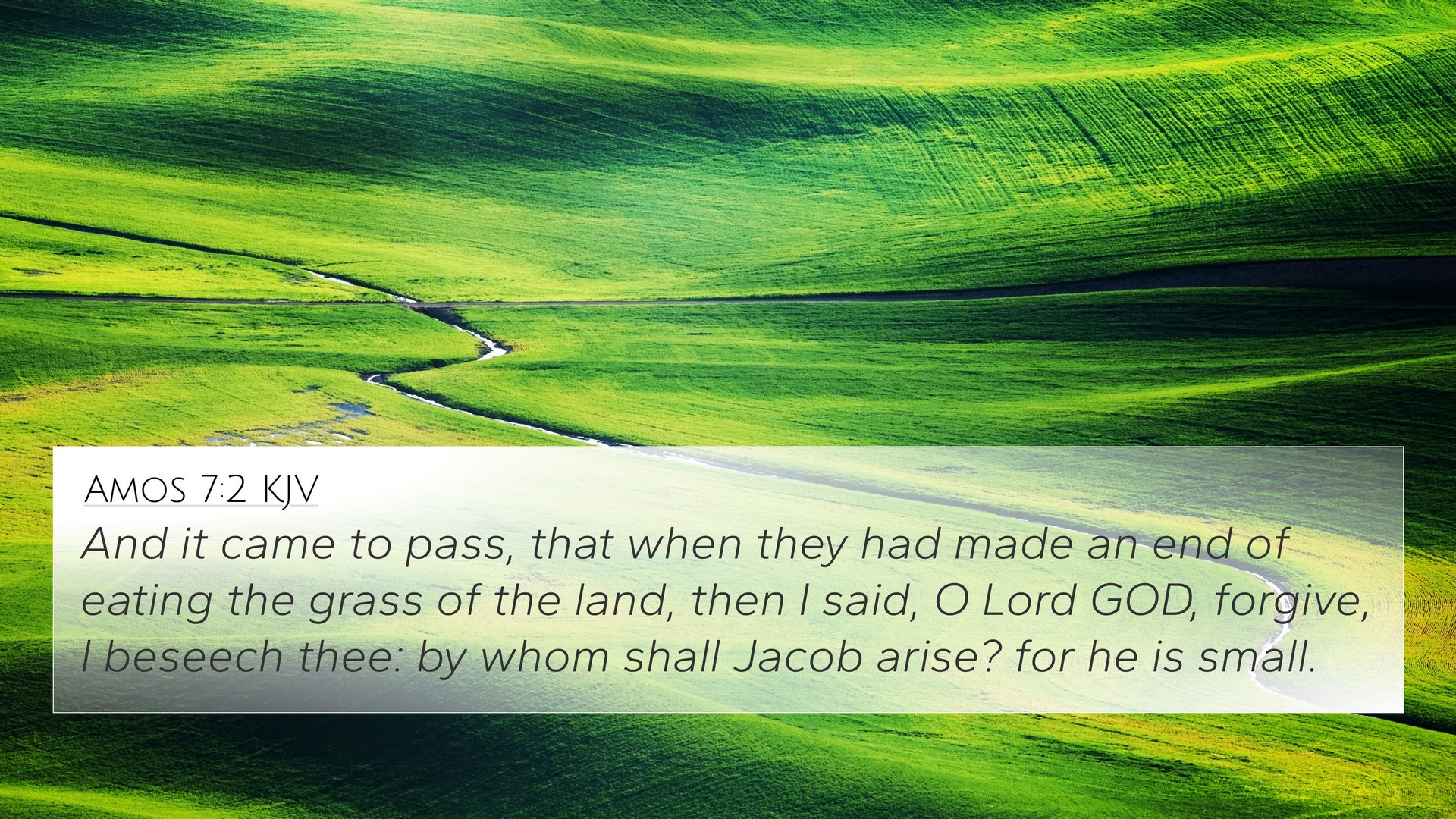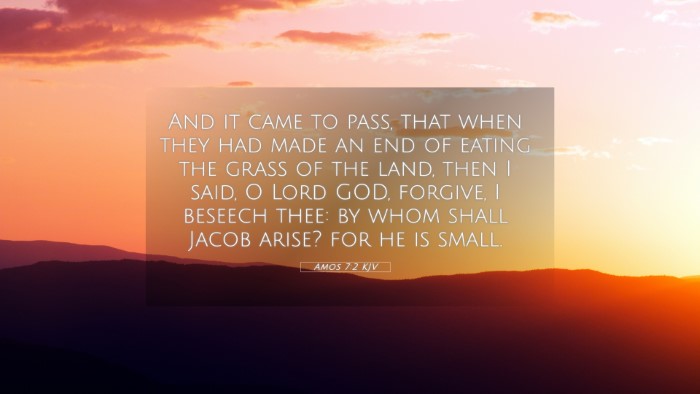Old Testament
Genesis Exodus Leviticus Numbers Deuteronomy Joshua Judges Ruth 1 Samuel 2 Samuel 1 Kings 2 Kings 1 Chronicles 2 Chronicles Ezra Nehemiah Esther Job Psalms Proverbs Ecclesiastes Song of Solomon Isaiah Jeremiah Lamentations Ezekiel Daniel Hosea Joel Amos Obadiah Jonah Micah Nahum Habakkuk Zephaniah Haggai Zechariah MalachiAmos 7:2 Similar Verses
Amos 7:2 Cross References
And it came to pass, that when they had made an end of eating the grass of the land, then I said, O Lord GOD, forgive, I beseech thee: by whom shall Jacob arise? for he is small.
Uncover the Rich Themes and Topics of This Bible Verse
Listed below are the Bible themes associated with Amos 7:2. We invite you to explore each theme to gain deeper insights into the Scriptures.
Amos 7:2 Cross Reference Verses
This section features a detailed cross-reference designed to enrich your understanding of the Scriptures. Below, you will find carefully selected verses that echo the themes and teachings related to Amos 7:2 KJV. Click on any image to explore detailed analyses of related Bible verses and uncover deeper theological insights.
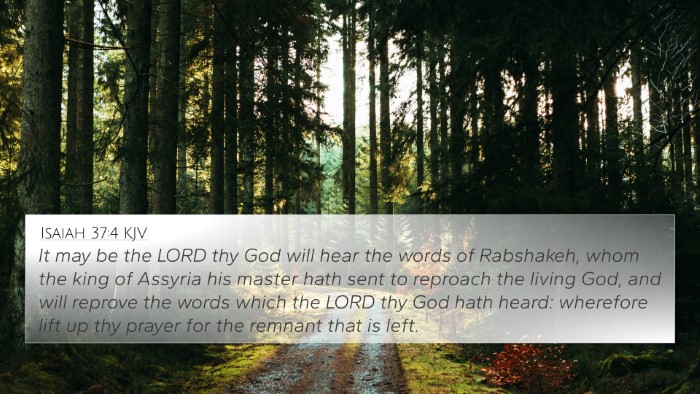
Isaiah 37:4 (KJV) »
It may be the LORD thy God will hear the words of Rabshakeh, whom the king of Assyria his master hath sent to reproach the living God, and will reprove the words which the LORD thy God hath heard: wherefore lift up thy prayer for the remnant that is left.

Ezekiel 11:13 (KJV) »
And it came to pass, when I prophesied, that Pelatiah the son of Benaiah died. Then fell I down upon my face, and cried with a loud voice, and said, Ah Lord GOD! wilt thou make a full end of the remnant of Israel?
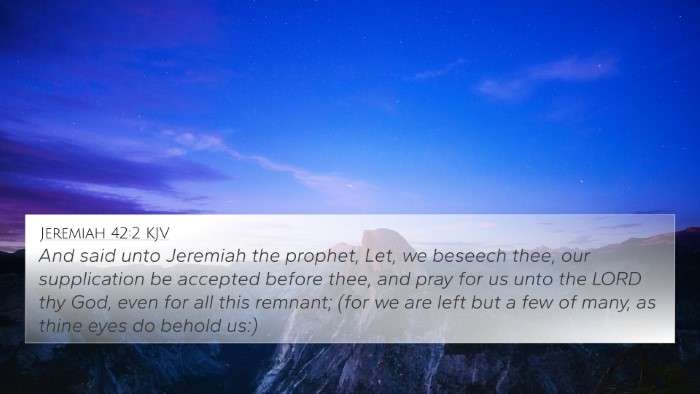
Jeremiah 42:2 (KJV) »
And said unto Jeremiah the prophet, Let, we beseech thee, our supplication be accepted before thee, and pray for us unto the LORD thy God, even for all this remnant; (for we are left but a few of many, as thine eyes do behold us:)
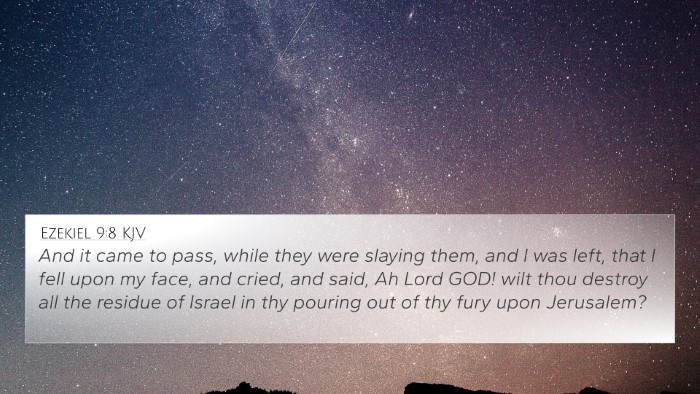
Ezekiel 9:8 (KJV) »
And it came to pass, while they were slaying them, and I was left, that I fell upon my face, and cried, and said, Ah Lord GOD! wilt thou destroy all the residue of Israel in thy pouring out of thy fury upon Jerusalem?
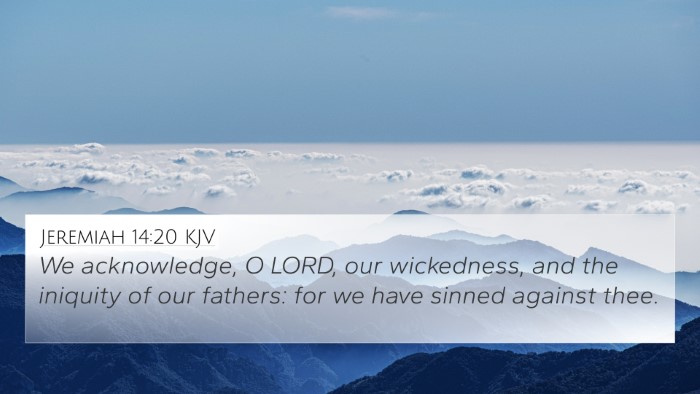
Jeremiah 14:20 (KJV) »
We acknowledge, O LORD, our wickedness, and the iniquity of our fathers: for we have sinned against thee.
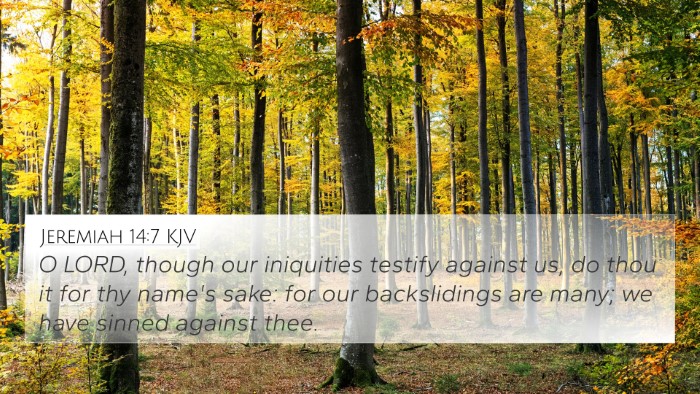
Jeremiah 14:7 (KJV) »
O LORD, though our iniquities testify against us, do thou it for thy name's sake: for our backslidings are many; we have sinned against thee.
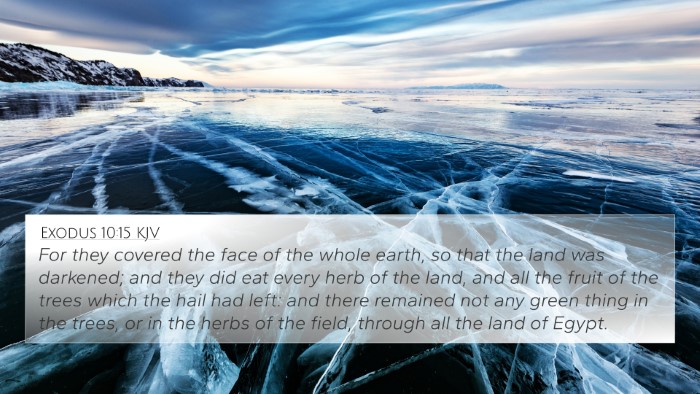
Exodus 10:15 (KJV) »
For they covered the face of the whole earth, so that the land was darkened; and they did eat every herb of the land, and all the fruit of the trees which the hail had left: and there remained not any green thing in the trees, or in the herbs of the field, through all the land of Egypt.
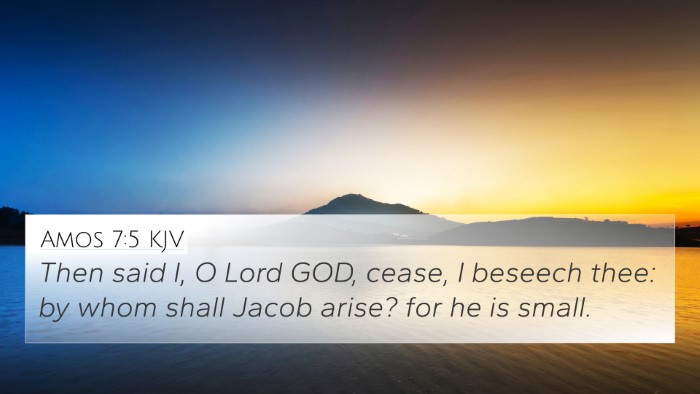
Amos 7:5 (KJV) »
Then said I, O Lord GOD, cease, I beseech thee: by whom shall Jacob arise? for he is small.
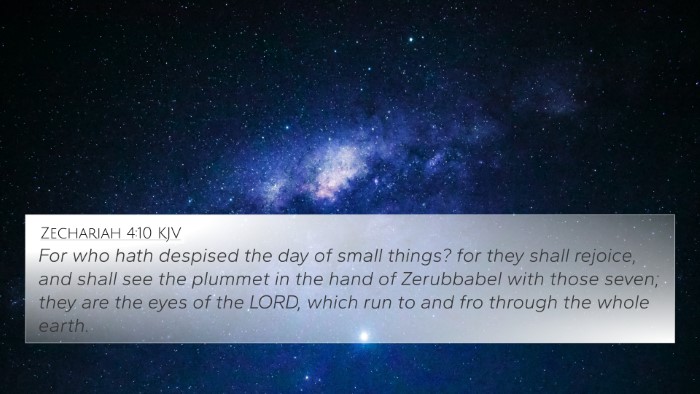
Zechariah 4:10 (KJV) »
For who hath despised the day of small things? for they shall rejoice, and shall see the plummet in the hand of Zerubbabel with those seven; they are the eyes of the LORD, which run to and fro through the whole earth.
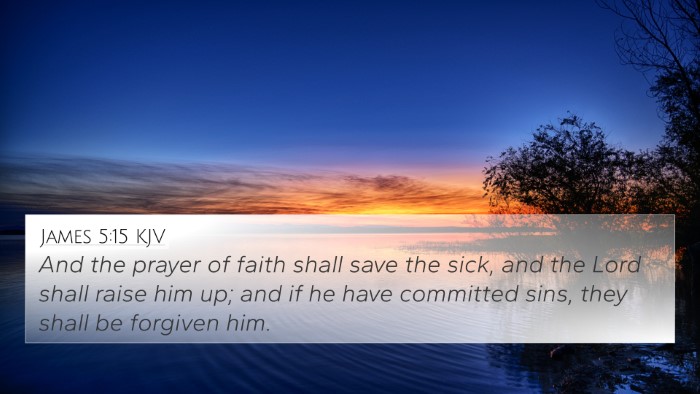
James 5:15 (KJV) »
And the prayer of faith shall save the sick, and the Lord shall raise him up; and if he have committed sins, they shall be forgiven him.
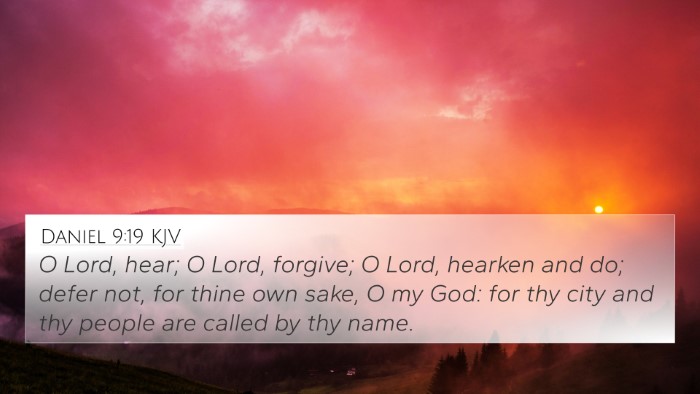
Daniel 9:19 (KJV) »
O Lord, hear; O Lord, forgive; O Lord, hearken and do; defer not, for thine own sake, O my God: for thy city and thy people are called by thy name.
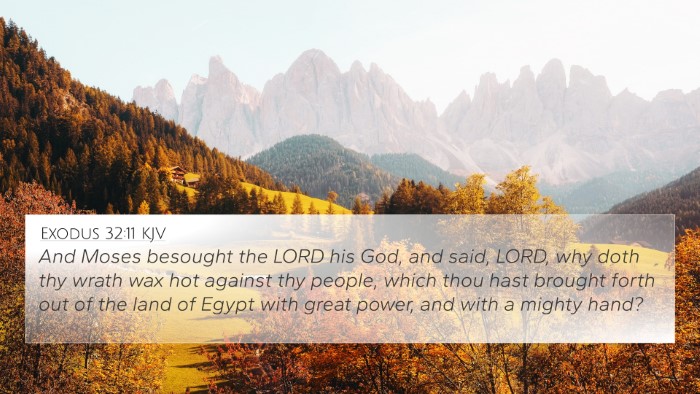
Exodus 32:11 (KJV) »
And Moses besought the LORD his God, and said, LORD, why doth thy wrath wax hot against thy people, which thou hast brought forth out of the land of Egypt with great power, and with a mighty hand?
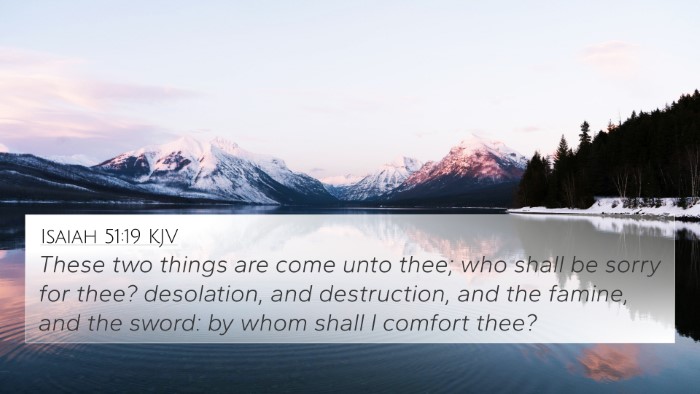
Isaiah 51:19 (KJV) »
These two things are come unto thee; who shall be sorry for thee? desolation, and destruction, and the famine, and the sword: by whom shall I comfort thee?
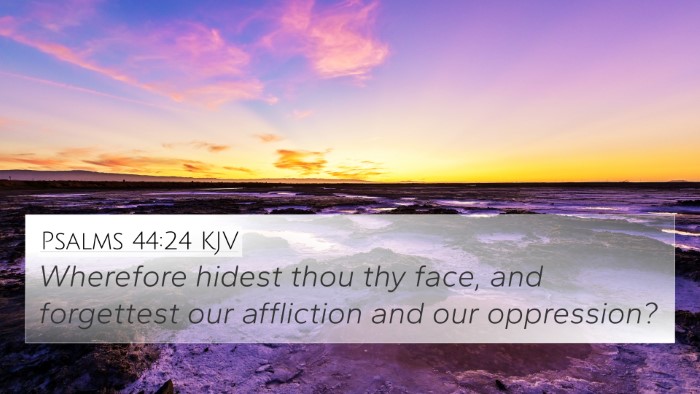
Psalms 44:24 (KJV) »
Wherefore hidest thou thy face, and forgettest our affliction and our oppression?
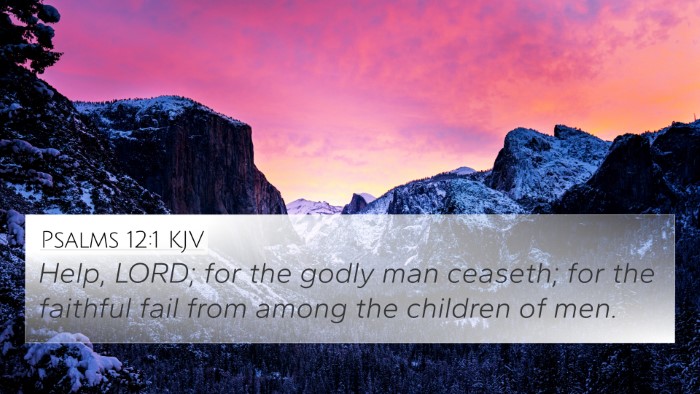
Psalms 12:1 (KJV) »
Help, LORD; for the godly man ceaseth; for the faithful fail from among the children of men.
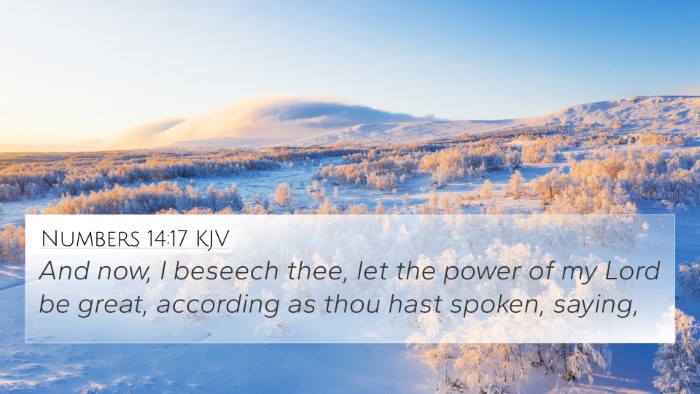
Numbers 14:17 (KJV) »
And now, I beseech thee, let the power of my Lord be great, according as thou hast spoken, saying,
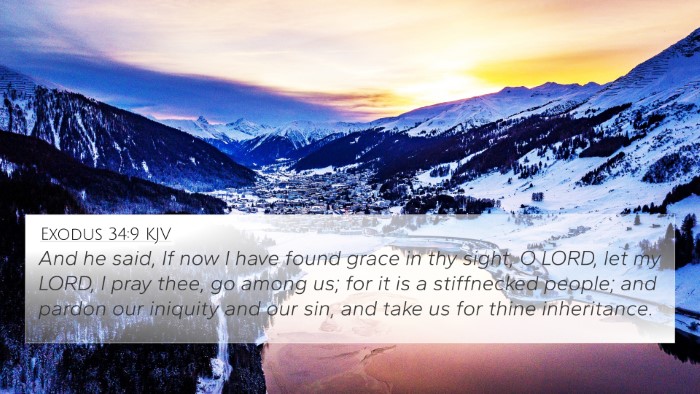
Exodus 34:9 (KJV) »
And he said, If now I have found grace in thy sight, O LORD, let my LORD, I pray thee, go among us; for it is a stiffnecked people; and pardon our iniquity and our sin, and take us for thine inheritance.
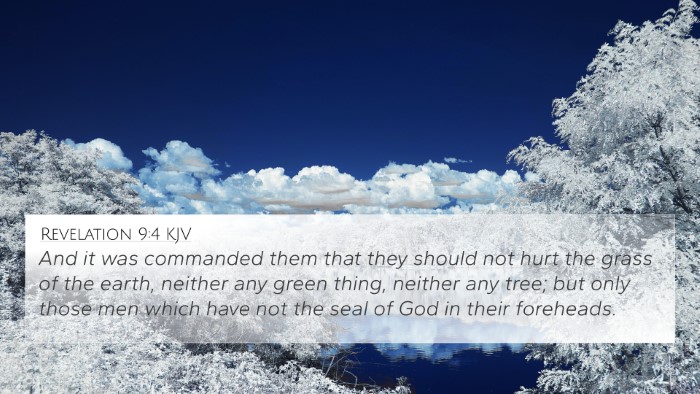
Revelation 9:4 (KJV) »
And it was commanded them that they should not hurt the grass of the earth, neither any green thing, neither any tree; but only those men which have not the seal of God in their foreheads.
Amos 7:2 Verse Analysis and Similar Verses
Amos 7:2 Meaning and Interpretation
Amos 7:2 states: "And it came to pass, when they had made an end of eating the grass of the land, then I said, O Lord God, forgive, I beseech thee: by whom shall Jacob arise? For he is small." This verse presents a deeply poignant moment in the prophet Amos's vision of God's impending judgment upon Israel, reflecting his deep compassion and intercession for the people.
Summary of Amos 7:2
The verse highlights the following key points:
- Divine Judgment: Amos sees a vision of locusts devouring the crops of Israel, indicative of divine judgment for their sins.
- Intercession: Amos pleads with God on behalf of the people, exemplifying the role of a prophet as an intercessor.
- Human Frailty: The mention of Jacob's smallness symbolizes the vulnerability of Israel, prompting God’s mercy.
Insights from Public Domain Commentaries
Matthew Henry's Commentary
Henry emphasizes the significance of Amos's plea. He interprets it as a demonstration of God's willingness to be persuaded by public intercessors. This plea underscores the frailty of Jacob (Israel) and the need for divine compassion, recognizing that the nation cannot stand without God's mercy.
Albert Barnes' Notes
Barnes highlights that Amos's observation of Israel's smallness serves as a reminder of the nation's spiritual and physical state. His appeal to God exemplifies the notion that, without forgiveness, Israel cannot endure. This reflects Israel's need for restoration and God's readiness to listen to sincere pleas.
Adam Clarke's Commentary
Clarke focuses on the catastrophic image of the locusts devouring everything. He notes that the despair of Amos indicates the severe consequences facing Israel should God not relent. Clarke points out the gravity of Amos's intercession—showing how the prophet understands the severity of their situation and the futility of their existence without God's intervention.
Cross-References to Amos 7:2
This verse connects with multiple other Biblical texts that enrich understanding through comparative analysis:
- Exodus 32:11-14: Moses intercedes for Israel, asking for God to spare them despite their sin.
- Jeremiah 14:7: Jeremiah expresses a similar pleading for divine mercy on behalf of a sinful nation.
- Romans 9:2-3: Paul shows his deep distress for his fellow Israelites, reflecting the weight of intercessory prayer.
- Luke 22:32: Jesus tells Peter that He has prayed for him, showing the power of intercession.
- Psalms 106:23: Highlights God's ability to be persuaded to spare Israel's disaster as Moses stands in the gap.
- Matthew 23:37: Jesus laments over Jerusalem, expressing desire for mercy amidst rebellion.
- Micah 7:18: Reflects on God's unique attributes and mercy, aligning with the theme of pardon and forgiveness.
- Hebrews 4:16: Encourages believers to approach the throne of grace to find mercy, paralleling Amos's plea.
Thematic Connections Across Scripture
Amos 7:2 opens the door for thematic discussions across scripture regarding the nature of God, intercession, and human frailty:
- The Role of the Prophet: Prophets like Amos and Jeremiah intercede for their people, stressing their role as mediators between God and man.
- God’s Mercy: The consistent theme of divine mercy throughout the Bible, where God’s compassion holds the potential for redemption, features prominently in Amos's plea.
- Israel’s Smallness and Vulnerability: Many texts reflect on Israel’s plight, providing a sobering look at their dependence on God for survival.
Using Cross-References for Deeper Study
Effective cross-referencing enhances understanding of scripture. Here's how:
- Identify Themes: Look for recurring themes such as intercession, mercy, and judgment across different books.
- Explore Context: Use cross-references to grasp the context surrounding specific verses, leading to a well-rounded interpretation.
- Develop Comparative Studies: Connect verses that address similar issues or present contrasting messages across Old and New Testaments.
Concluding Thoughts
Amos 7:2 serves as a powerful reminder of the importance of intercession and the delicate balance of divine judgment and mercy. Through the insight of major commentators and scriptural connections, this verse invites deeper contemplation on the role of prophets, the nature of God, and the fragile state of humanity. Engaging with cross-references provides a rich tapestry for understanding the connections between various Bible verses—strengthening one's grasp of the overarching narrative of scripture.
